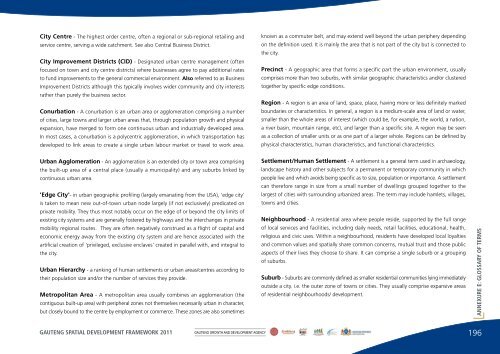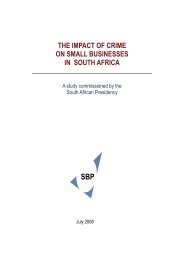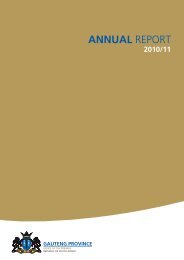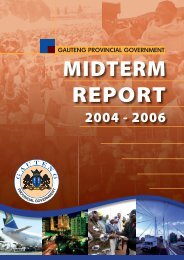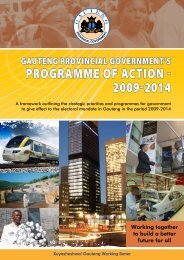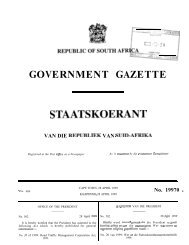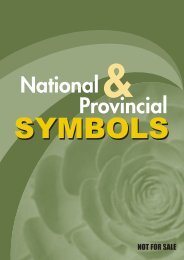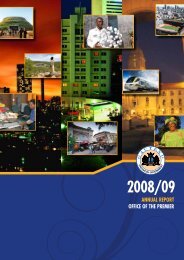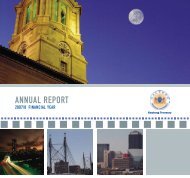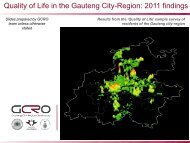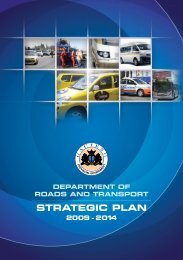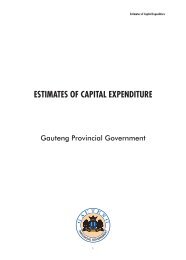the gauteng spatial development framework - Gauteng Online
the gauteng spatial development framework - Gauteng Online
the gauteng spatial development framework - Gauteng Online
Create successful ePaper yourself
Turn your PDF publications into a flip-book with our unique Google optimized e-Paper software.
City Centre - The highest order centre, often a regional or sub-regional retailing andservice centre, serving a wide catchment. See also Central Business District.City Improvement Districts (CID) - Designated urban centre management (oftenfocused on town and city centre districts) where businesses agree to pay additional ratesto fund improvements to <strong>the</strong> general commercial environment. Also referred to as BusinessImprovement Districts although this typically involves wider community and city interestsra<strong>the</strong>r than purely <strong>the</strong> business sector.Conurbation - A conurbation is an urban area or agglomeration comprising a numberof cities, large towns and larger urban areas that, through population growth and physicalexpansion, have merged to form one continuous urban and industrially developed area.In most cases, a conurbation is a polycentric agglomeration, in which transportation hasdeveloped to link areas to create a single urban labour market or travel to work area.known as a commuter belt, and may extend well beyond <strong>the</strong> urban periphery dependingon <strong>the</strong> definition used. It is mainly <strong>the</strong> area that is not part of <strong>the</strong> city but is connected to<strong>the</strong> city.Precinct - A geographic area that forms a specific part <strong>the</strong> urban environment, usuallycomprises more than two suburbs, with similar geographic characteristics and/or clusteredtoge<strong>the</strong>r by specific edge conditions.Region - A region is an area of land, space, place, having more or less definitely markedboundaries or characteristics. In general, a region is a medium-scale area of land or water,smaller than <strong>the</strong> whole areas of interest (which could be, for example, <strong>the</strong> world, a nation,a river basin, mountain range, etc), and larger than a specific site. A region may be seenas a collection of smaller units or as one part of a larger whole. Regions can be defined byphysical characteristics, human characteristics, and functional characteristics.Urban Agglomeration - An agglomeration is an extended city or town area comprising<strong>the</strong> built-up area of a central place (usually a municipality) and any suburbs linked bycontinuous urban area.'Edge City'- in urban geographic profiling (largely emanating from <strong>the</strong> USA), 'edge city'is taken to mean new out-of-town urban node largely (if not exclusively) predicated onprivate mobility. They thus most notably occur on <strong>the</strong> edge of or beyond <strong>the</strong> city limits ofexisting city systems and are generally fostered by highways and <strong>the</strong> interchanges in privatemobility regional routes. They are often negatively construed as a flight of capital andeconomic energy away from <strong>the</strong> existing city system and are hence associated with <strong>the</strong>artificial creation of 'privileged, exclusive enclaves' created in parallel with, and integral to<strong>the</strong> city.Urban Hierarchy - a ranking of human settlements or urban areas/centres according to<strong>the</strong>ir population size and/or <strong>the</strong> number of services <strong>the</strong>y provide.Metropolitan Area - A metropolitan area usually combines an agglomeration (<strong>the</strong>contiguous built-up area) with peripheral zones not <strong>the</strong>mselves necessarily urban in character,but closely bound to <strong>the</strong> centre by employment or commerce. These zones are also sometimesSettlement/Human Settlement - A settlement is a general term used in archaeology,landscape history and o<strong>the</strong>r subjects for a permanent or temporary community in whichpeople live and which avoids being specific as to size, population or importance. A settlementcan <strong>the</strong>refore range in size from a small number of dwellings grouped toge<strong>the</strong>r to <strong>the</strong>largest of cities with surrounding urbanized areas. The term may include hamlets, villages,towns and cities.Neighbourhood - A residential area where people reside, supported by <strong>the</strong> full rangeof local services and facilities, including daily needs, retail facilities, educational, health,religious and civic uses. Within a neighbourhood, residents have developed local loyaltiesand common values and <strong>spatial</strong>ly share common concerns, mutual trust and those publicaspects of <strong>the</strong>ir lives <strong>the</strong>y choose to share. It can comprise a single suburb or a groupingof suburbs.Suburb - Suburbs are commonly defined as smaller residential communities lying immediatelyoutside a city. i.e. <strong>the</strong> outer zone of towns or cities. They usually comprise expansive areasof residential neighbourhoods/ <strong>development</strong>.ANNEXURE E: GLOSSARY OF TERMSGAUTENG SPATIAL DEVELOPMENT FRAMEWORK 2011GAUTENG GROWTH AND DEVELOPMENT AGENCY196


